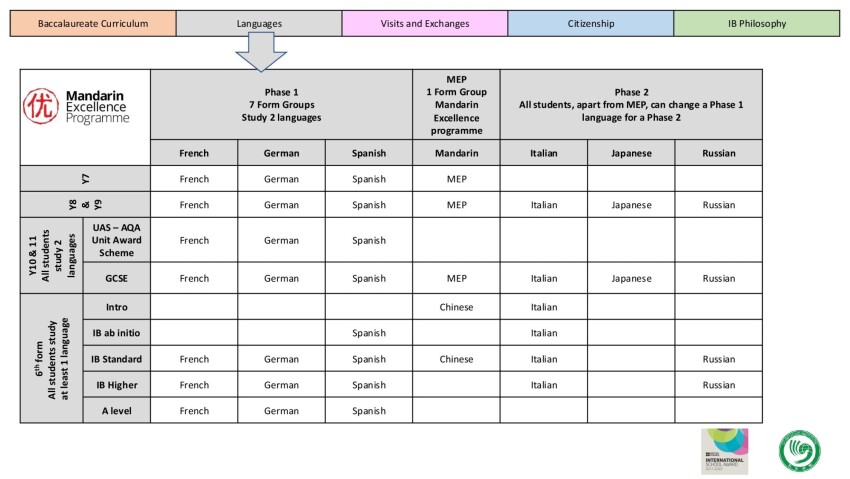Languages
Languages is a flagship department at Anglo European School offering an unparalleled range of subjects to aspiring linguists and native speakers of other specified languages.
As part of our curriculum, every student in the school, apart from those taking exams, is expected to spend time abroad each year either on residential or as part of our extensive exchange programme. We offer opportunities that are not equalled in a Comprehensive school in order to truly embed fluency in the languages studied and to foster an appreciation of the culture and heritage of the countries visited.
Scientific studies have found that speaking two or more languages is a great asset to our cognitive processing. So, as well as being culturally enriching, speaking a foreign language enhances the functionality of our brains boosting our problem-solving ability.
Teaching staff and range of languages provided
The languages department is staffed by a team of specialist teachers and led by a management team under the direction of the Head of Department, Mrs Latimer. Mrs. Latimer has overall responsibility for all key stages, for the vision and ethos of the department, for curriculum development and for staff development needs.
Subject leaders are also nominated for French & Italian, Mrs R Wootton; Spanish, Miss H Geraghty; German; Mr K Jepson and Chinese; Mr D Arden. EAL, under the management of Mrs A McDermott, is also part of the wider languages department.
A CLEC teacher from China also offers extra support to our students and works in schools in the local community. We are one of two sites to host the Jiangsu Centre for Chinese Studies and we are also a recognised Confucius Classroom.
Curriculum overview
The languages curriculum is organised as follows:
-
Phase one languages – French, German and Spanish
-
Phase two languages – Russian, Italian and Japanese
-
Mandarin Excellence Programme (MEP) – Mandarin Chinese
All Year 7 students take two languages from the phase one group of French, Spanish and German. Those studying Chinese take this subject only as it has a double timetable allocation. Dedicated study of Chinese continues through to Year 11, culminating in entry for GCSE. In Year 8 most students continue with the two languages studied in Year 7 which are pursued through to GCSE. However, these students can elect to drop one of their phase one languages at the end of Year 7 and pick up a phase two language in Year 8 from amongst Italian, Japanese or Russian instead. Hence most students take two language GCSE’s, other than those on the MEP and a few weaker linguists who are supported through the FCSE qualification. In this way we endeavour to accommodate the needs of all our students and offer the best possible choice.
All students in the Sixth Form have the option to study a language and a range of courses are available from which to choose. We offer A Levels in French, German and Spanish. Additionally, we offer Chinese, French, German, Italian, Russian and Spanish as part of the highly acclaimed International Baccalaureate Diploma at different levels ab initio, standard and higher level. We also offer entry level qualifications across a range of languages. There is the opportunity to study selected parts of the IB Diploma with A Levels. We believe that this provides unrivalled opportunity for linguists to combine qualifications in a way which best suits their wider study interests.
Languages Curriculum Map

Languages intent – defining today, transforming tomorrow
The Modern Foreign Language department seeks to make every learner a language learner. We reflect the findings of the MFL Pedagogy Review in providing a broad linguistic curriculum to all students.
We value the importance of phonics, vocabulary, and grammar in language acquisition whilst also emphasising that language learning is more than this. We strive for students to understand the importance of cultural, historical and literary knowledge in order to develop inquisitive and open-minded students in line with our school’s international ethos.
Implementation
Our curriculum uses a variety of relatable contexts to teach listening, speaking, reading and writing as integrated skills. These contexts and the linguistic competencies of phonics, vocabulary and grammar spiral as students advance towards proficiency in year 11 and beyond.
In lessons students build on prior learning through retrieval testing, teachers present new material in steps, giving students time to practice. Skilful questioning and structured talk enable teachers to check for understanding whilst expert modelling, scaffolding and increasing challenge, guide and lead students to use the language independently. Students are monitored through a range of assessment techniques and given constructive teacher feedback in order to succeed.
We ensure that students appreciate the cultures which underpin their language study. Our international visits programme enables students to realise their value in real world contexts. Similarly, our focus on careers and university links show students how these skills will benefit them later in life.
Impact
We strive to achieve at least ALPS Grade 3, meaning that our students are well above average, and we work towards achieving even better results each year. However, not only do we achieve a strong set of examination results, but our impact also goes far beyond data. Our students become well rounded and understanding individuals who show a cultural understanding and enthusiasm towards to languages with many continuing with languages into 6th form and beyond to degree level. Additionally, students often use their language learning experiences to give them the confidence to pursue internationally focused courses or placements abroad.
Determination of language options
Prospective students are invited, through their parents, to specify preferred languages upon application to the school. The cutting-edge Mandarin Excellence Programme, is limited to 30 students per year. Interest in this programme, which is subject to selection, should be registered on application to the school.
Students with close familial association or native speaker background in one of our phase one languages are expected to study that language alongside a second choice. However native speakers with strong mother tongue fluency in all four key skills (listening, reading, speaking and writing) are exempted from this requirement and may be considered for GCSE entry at a later date. The same arrangement applies for year 8 students with close familial association or native speaker background in phase two languages.
Whilst the combination of languages studied from Year 7 onwards is open to student choice, and we endeavour to honour preferences, the precise combination of languages for which any student is selected is subject to availability and timetabling.
Native speaker provision
Native Speakers are identified on admission to the school and their level of language is assessed during the Year 7 induction programme. The department supports languages provided on our curriculum through extra activities in addition to the class work completed by the rest of the class or with the agreement of parents, on extension work of a more advanced nature. We also offer after-school Native speaker lessons to students in year 8 and above to prepare for the GCSE which they may sit as an additional language from year 9. In these lessons, there is particular emphasis on improving the accuracy of written language, which is often the weakest of the four skills.
Setting
We teach mixed ability sets in Y7-Y9 and students are set according to ability in Y10 and Y11.
Overseas visits programme
An extensive overseas visits programme is supported by all staff from the languages team along with all other full time teaching staff who accompany students annually for 10 days to France, Germany, Spain, Italy and China. Longer exchange visits are available to year 10 students to Germany and France and sixth form students have the possibility of work experience in the country of their language studied. The visits programme enhances the language learning process enormously and we encourage as many students as possible to take part in this programme. It also makes a significant impact on our students’ personal development. Annually, approximately 50% of our 1400 student take part in this programme. However, no such visits take place in Year 11 or the Upper Sixth, due to exams. Further information about our International Visits Programme can be found here.
Other extra-curricular activities
We run support clinics for each language outside the curriculum and offer specific sixth form clinics on the timetable for sixth formers to attend as and when a need arises. Our Arabic Language provision takes places as a lunch time class in Year7-10 and then as an introductory level 1 qualification in Sixth Form. As part of our work with Qatar Foundation International, we are able to offer several extracurricular trips to support the Arabic language and cultural studies such as to Cambridge University and Eco Mosque.
There are also day visits to the Japanese Embassy, the British Film Institute, the Horniman Museum and British Museum and many more.
We support our sixth formers in the preparation for their speaking exams through the help of native speaker parent volunteers. Each sixth former is given a slot on their timetable above the standard language lesson provision.
